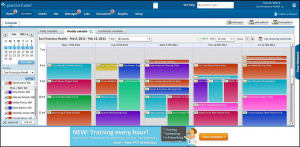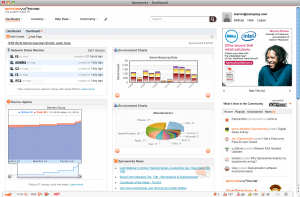Ad-Supported Software Is Here to Stay

During my research for our series on free software, I encountered a number of successful companies offering free solutions through an ad-supported business model. The ad-supported model is a departure from traditional propriety software licenses and the monthly subscriptions fees used by SaaS providers.
These companies operate by attracting large user bases and charging potential advertisers a fixed price per ad impression (basically a page view). According to the San Francisco Chronicle, this number is as much as $200 per thousand impressions in Practice Fusion, a popular EMR and practice management solution, and $100 in Spiceworks, a free IT management/help desk provider. This is compared to the $10 that Facebook and other services charge for a comparable number of impressions.
Despite the fact that a handful of vendors have found success by offering their products through this model, it’s rare for any one segment to feature more than a single free, ad-supported solution. And only a few have made significant inroads into their markets.
Once such company is Practice Fusion, a San Francisco-based medical software company that’s dramatically changed the segment since its entry in 2005. Since the company’s founding, Practice Fusion has claimed a healthy percentage of the EMR market share, currently reaching 150,000 users. Practice Fusion sells ad space to customers that include pharmaceutical companies, and places them discretely, in such in a way that doesn’t interrupt user activity.
Ad-supported software is not without its detractors. From a revenue standpoint, free software can be risky. Businesses on an ad model are subject to the marketing budgets of their advertising clients, which are more fluid than the contracts and upfront license fees of proprietary software vendors, or even the monthly subscriptions offered by cloud providers. Others argue that ad-supported software necessitates compromises in design.
From a user’s perspective, advertising can be distracting, unsightly, obtrusive and annoying. Few Internet users will report a positive experience with advertising, regularly dealing with pop-ups, expanding banners and tedious video ads. But if managed and implemented properly, a feat that successful developers strive to achieve, ads are simply a footnote in an otherwise enjoyable user experience.
One company to execute on this vision is Spiceworks. Founded in 2006, the people behind Spiceworks sought to apply the principles of iTunes and Google Apps—both incredibly successful ad-supported consumer products—to an IT management solution. Today, Spiceworks has grown into an IT community of more than 2 million users, with 1,200 advertisers in the technology space, including Microsoft and Dell.
Spiceworks delivers IT asset management, virtualization management, help desk software, network monitoring, server monitoring, cloud computing management and way more, for the hard-to-believe price of zero dollars.
In the accounting space, Wave Accounting has demonstrated the ability to satisfy clients with its full-featured, SaaS accounting solution. Wave delivers a solid set of features geared toward small and SOHO businesses, including double-entry bookkeeping (with GL, AR, AP, sales tax reporting, etc.), payroll integration, credit card/bank accounting syncing, and personal finance functionality. The company has been covered by The New York Times, PC Mag, and Inc.
Ultimately for users it comes down to one thing: does the software perform. In the case of the vendors feature above, the answer is a resounding yes. Not only do they perform, but they do it for free, and their massive followings are a tribute to this balancing act between performance, advertising and price.
Want to read more insider-perspective posts? Browse our entire archive of blog posts on insights gleaned from the software industry by visiting the Industry Insights section of the Business-Software.com blog.







